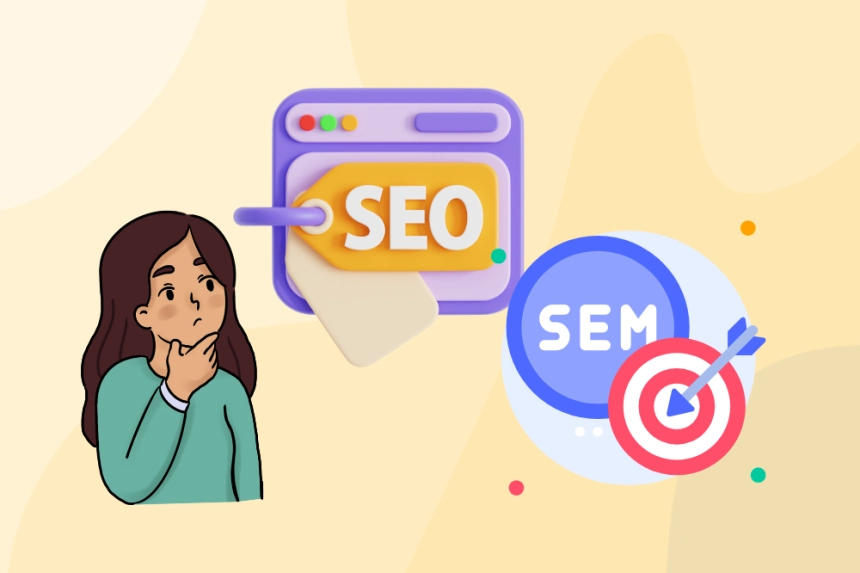What is the difference between SEO and SEM?


In today’s digital era, search engine marketing has become indispensable for businesses that wish to enhance their online visibility. Although often used interchangeably, SEO (Search Engine Optimization) and SEM (Search Engine Marketing) are distinct concepts that play different roles in digital marketing strategy. Below, we will explore the differences, features, and benefits of both in depth.
Understanding SEO
What is SEO?
SEO, or search engine optimization, is the process of optimizing a website to improve its visibility in the organic search results of search engines. This strategy focuses on increasing the quality and quantity of traffic to the website through techniques that enhance ranking in search engine results pages (SERP).
Types of SEO
On-Page SEO
On-Page SEO refers to the optimization of internal elements of a website. This includes:
- Keywords: Strategic selection and use of relevant keywords.
- Content: Creating high-quality content that provides value to the user.
- Tags and Meta Descriptions: Effective use of titles, headers, and descriptions to enhance relevance.
- Technical Optimization: Improving loading speed, responsive design, and code quality.
Off-Page SEO
Off-Page SEO refers to external factors that affect a website's visibility. This includes:
- Backlinks: Links from other sites that point to yours, helping to increase authority.
- Social Media: Promoting content on social platforms to generate additional traffic.
- Brand Mentions: Increasing awareness through mentions in relevant media and blogs.
Benefits of SEO
- Cost-effective: In the long run, SEO can be more economical than other digital marketing strategies.
- Organic Traffic: Organic traffic is highly relevant, which can result in high conversion rates.
- Credibility: Users tend to trust organic results more than paid ads.
Understanding SEM
What is SEM?
SEM, or search engine marketing, is a strategy that involves promoting websites through paid ads on search engines. SEM includes SEO but primarily focuses on paid campaigns that can generate immediate traffic.
Components of SEM
PPC Advertising
The most common SEM model is pay-per-click (PPC), where advertisers pay each time a user clicks on their ad. The most commonly used platforms for PPC are Google Ads and Bing Ads.
Remarketing
Remarketing allows companies to reconnect with users who have previously visited their website by showing them specific ads on other platforms.
Benefits of SEM
- Immediate results: Unlike SEO, SEM can generate traffic almost instantly.
- Precise targeting: SEM platforms allow for detailed targeting, which increases the likelihood of conversion.
- Budget flexibility: Companies can adjust their budget in real-time based on campaign performance.
Comparison between SEO and SEM
Feature SEO SEM
| Cost | Organic (long term) | Pay-per-click
| Time for results | Long term (months) | Immediate
| Focus | Organic traffic | Paid ads
| Durability | Sustainable results | Depends on budget
| User trust | High | Variable
Which to choose: SEO or SEM?
The choice between SEO and SEM isn’t necessarily an “either/or” scenario, but rather a “both/and.” Both strategies are complementary and can work together to maximize a website’s visibility and traffic.
Combined Strategy
- Use SEO to build a solid foundation of long-term organic traffic.
- Use SEM for temporary campaigns, new products or services, and to capture traffic during specific times of the year.
- Leverage SEM data and analytics to inform and optimize SEO strategies.
Conclusion
Understanding the difference between SEO and SEM is crucial for developing an effective digital marketing strategy. While SEO may take time to yield results, it is a valuable long-term investment. On the other hand, SEM offers immediate results and precise targeting, ideal for specific campaigns. Ultimately, utilizing both strategies can provide a comprehensive approach that maximizes success in search engines.
Would you like to learn more about how to implement SEO and SEM in your business? Let us know in the comments!




